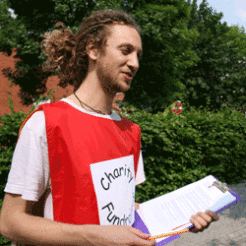A groundswell of discontent about face-to-face fundraising is building in Edinburgh, as a national newspaper backs calls from business leaders and politicians for a crackdown on chugging, calling the activity aggressive and invasive.
The Scotsman today published an editorial expressing relief that “at last someone in authority has taken a stand against the blight on our streets that is the chugger”.
The editorial follows calls from Tom Campbell, the chief executive of Essential Edinburgh which manages the city centre, for a summit of the leaders of charities who use face-to-face fundraising in the city. Campbell said that street fundraisers were a bigger problem than beggars because beggars tend to be passive, but fundraisers actively try to engage the public.
Campbell is writing to the chief executives of the charities involved calling for meetings on the issue. But while the Public Fundraising Regulatory Authority (PFRA) is in charge of regulating street fundraising in the area, neither Campbell nor anyone in his organisation has contacted the regulator for a meeting.
Chuggers 'clog up flow of business'
Campbell's concerns were echoed by the Edinburgh Chamber of Commerce. A spokesman told The Scotsman that businesses were afraid of expressing their opposition to face-to-face fundraising because they may be considered uncharitable. He said the presence of chuggers in the city clogged up the flow of business in the city centre.
Local Conservative councillor Iain Whyte added his voice to the chorus of dissent, suggesting that the Scottish parliament should intervene.
The Scotsman enthusiastically welcomed the tenor of the public comments by the Edinburgh leaders, writing that charities should not have to resort to street fundraising. “They have countless ways to tap into the benevolent hearts of caring people in Edinburgh and beyond. Press-ganging them in the open in the streets should not be one of them.”
Mick Aldridge, chief executive of the PFRA, said it was surprising and disappointing that the issue has taken hold, particularly in light of the relaxed approach Edinburgh City Council has to street fundraising and the extremely low number of complaints about the method that are tabled by members of the public in Scotland as a whole.
He added that there was no evidence to support claims that street fundraisers put people off shopping.
While there is no site management agreement for the Scottish capital, Aldridge said that the PFRA has not been approached to develop one by Campbell's group or by the council. He said the PFRA would expect to be involved in any summit or meeting about the issue of face-to-face in Edinburgh and that he would be happy to attend.
The current state of the licensing regime for public collections in Scotland is broadly similar to that in England and Wales, with the sector waiting on the implementation of rules covering cash, direct debit and other public collections outlined in the Charity Trustees and Investments Act 2005. Aldridge told Civil Society it was unlikely the regime would be implemented before the summer.








